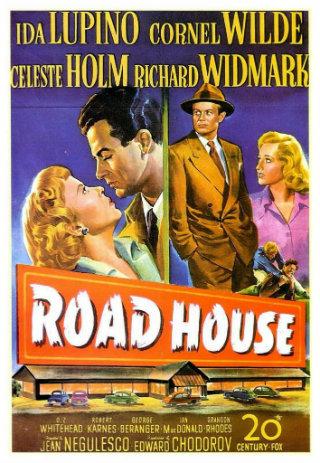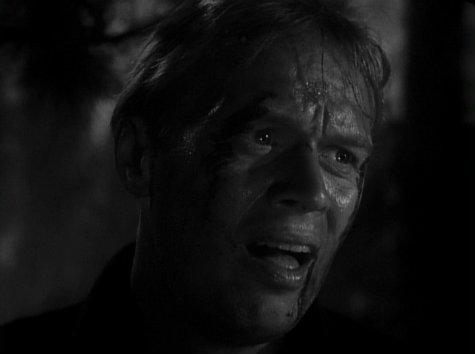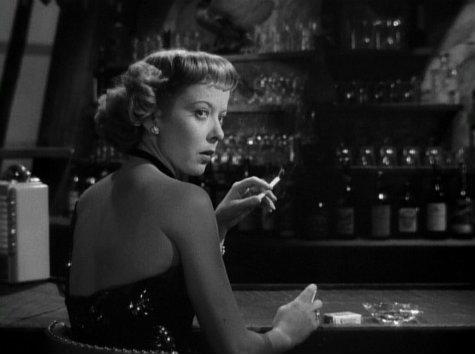
We tend to think of film noir in an urban setting, the iconography of neon and slick, wet streets being such a powerful influence. However, the style isn’t confined to those mean city streets with their ominously shadowed alleyways. Noir can be every bit as effective in a rural or small town environment – the photographic opportunities, while obviously different, still exist and dark existentialism can be found wherever human beings interact. Road House (1948) is one of those partially neglected noir pictures that moves the action out of the city and places it in a small town near the Canadian border, or to be more exact in and around the titular establishment. The somewhat isolated setting works particularly well in this instance, and the classic romantic triangle that underpins the plot has the advantage of involving three top class performers in roles that play to their individual strengths.
The only alley in Road House is the one with bowling lanes in the business owned by Jefty (Richard Widmark) and managed by his childhood friend Pete (Cornel Wilde). It seems that Jefty inherited his money and kept his old friend by his side after the war ended. At the beginning of the movie both men are on the best of terms, coming across as something akin to business partners as opposed to boss and employee. However, a fly in the ointment is introduced in the shape of Lily Stevens (Ida Lupino), the new lounge singer and, it’s heavily implied, Jefty’s latest squeeze. The opening scene where Pete comes upon the world-weary Lily reclining, shoes off and ever-present cigarette burning on the table edge, in Jefty’s office offers up some great hard-boiled and insolent dialogue. Pete initially flirts and then, as he realizes that Lily is just another in a long line of “entertainers” that Jefty has brought back, fences with the newcomer. Despite Jefty’s obvious enthusiasm, Pete has seen it all before and tries to pack Lily off on the next bus out of town. However, Lily is one of those tough broads from Chicago and has no intention of being bounced so easily. Pete slowly warms to the idea that Lily may after all be good for business when her debut performance (a smoky, throaty rendition of One for my Baby) goes down a storm with the customers. When Jefty heads off for a hunting trip, Pete and Lily find themselves spending more and more time together and their mutual attraction grows. The problem is that neither one of them had cottoned on to the depth of Jefty’s feelings, and it comes as a huge shock when he arrives back with a marriage license in his pocket and a proposal on his lips. The situation’s obviously not a comfortable one so the two lovers decide the only option is to pack up and be on their way. While it was only hinted at and alluded to before, it now becomes clear that Jefty is both devious and emotionally unstable. He arranges to have Pete framed on a trumped-up embezzlement charge and put on trial. But this is only the tip of the iceberg; Jefty uses his influence to swing the court decision and have Pete placed in his custody. Pete is thus transformed into a classic noir dupe, tormented and pushed to the very brink by the increasingly erratic Jefty as Lily can do little but stand helplessly by and watch. The tale powers along towards a terrific and melodramatic climax in the forests along the Canadian border as the former friends go head to head, with love and freedom the prizes at stake.

I guess director Jean Negulesco is most famous for the glossy dramas and musicals he made during the 50s. For me though, his most interesting work remains the tight little thrillers and noir pictures he produced in the 40s. I’m immensely fond of The Mask of Dimitrios, adapted from Eric Ambler’s novel, a low budget thriller dripping in noir atmosphere that makes excellent use of the talents of Sydney Greenstreet and Peter Lorre. Road House though is probably the purest piece of noir that Negulesco worked on, and it indicates that he had a great deal of ability in this area had he chosen to exploit it further. With Joseph LaShelle taking care of the cinematography, Negulesco uses the sets of the Fox backlot to create a stifling yet strangely attractive world in which his three leads can enact their overheated drama. Forests have always held a menacing air, particularly when the action takes place at night allowing the leaves and branches to cast their dappled shadows. It also lends a touch of confusion, characters stumble blindly though whipping, blinding vegetation either in pursuit or seeking refuge. And then there’s the splendid isolation, the sense that events have exited the typical everyday world and passed into a more primal and uncertain landscape. It’s also worth mentioning how music is used so sparsely in Road House: apart from the numbers Lily sings as part of her set, the action plays out against a natural sounding backdrop. Music can of course be extremely effective in building and sustaining mood, but there are enough fireworks taking place on the screen in this movie to render it largely unnecessary.

The US DVD of Road House includes a short documentary feature that focuses on Richard Widmark and Ida Lupino, and it’s particularly heartening to see it drawing attention to Ms Lupino’s abilities. Apparently, Darryl Zanuck acquired the script for the movie specifically with Ida Lupino in mind. She was only thirty years old when the film was made but had already taken on a kind of worldly air which, when combined with a Gloria Grahame style sexiness, slotted nicely into the noir world. Lupino was an incredibly talented woman and, along with her acting, carved out a niche for herself as one of the few female directors of that era – The Hitch-Hiker is a fantastic piece of low-budget filmmaking. Lupino is cast as a sort of unwitting and reluctant femme fatale whose presence provides the spark for what follows. The aforementioned documentary also makes the point that Lupino, as the drifter with a possibly shady past who arrives in town, gets the traditionally male part in the movie and she certainly infuses her role with the kind of tough fatalism that we normally see noir men display. The movie essentially belongs to Widmark and Lupino, with the latter dominating the opening hour before the former grabs all the attention in the last third. Widmark was still tied into the psycho parts that followed on from his searing debut in Hathaway’s Kiss of Death. He comes across as quite affable in the early stages of the story, demonstrating the range that he was soon to explore further as his career progressed, before gradually descending into the giggling lunacy that he practically owned the copyright on. The thing is though, Widmark always had an edge, an emotional fragility if you like, and so the transition his character goes through is never totally jarring – it feels as though it’s simply a natural progression. With two powerhouse performers at work a stable centre was necessary, and that was provided by Cornel Wilde. His part was considerably less showy but that stoicism was important and stops the whole picture from sliding too far and losing credibility. Celeste Holm rounded out the cast in a somewhat thankless part as the girl Wilde throws over in favour of Lupino, helping to save the day in the end and suffering a few unkind digs directed at her appetite and weight along the way.
Road House was one of the last noir movies that Fox put out on DVD in the US before shutting up shop and moving into the murkier waters of MOD releases. The transfer is a good enough effort, despite a warning that the elements used were the best available, there’s no especially noticeable damage to the print. The disc has some nice extra features too: a commentary track with Eddie Muller and Kim Morgan, the documentary I’ve already spoken about, and some galleries. When Fox were running their film noir series there were a few questionable entries, but Road House is the real deal. The direction and performances are spot on and the pacing is very well-judged. While I wouldn’t class this as a forgotten movie, I think it’s fair to say it hasn’t always been given its due. Highly recommended for fans of the leads or film noir.
